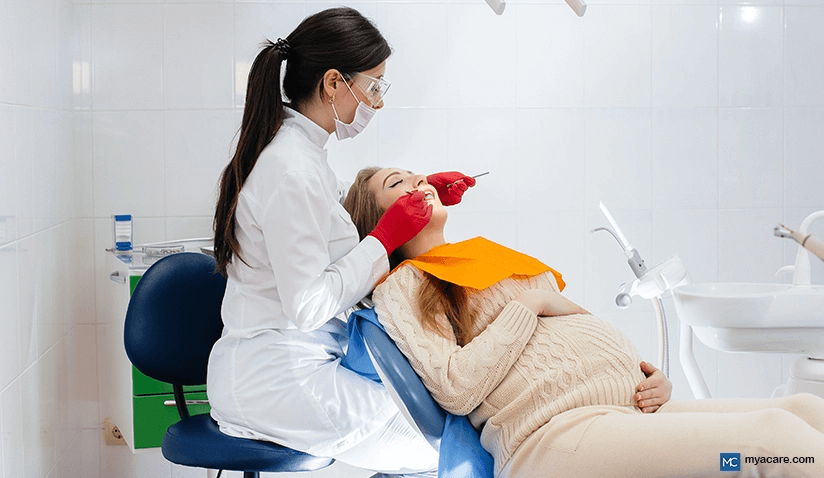How to Take Care of Teeth During Pregnancy

Pregnancy is accompanied by physiological changes in the female body which may adversely impact their oral health. If not addressed promptly, poor oral health can result in complications such as high blood pressure during pregnancy, premature birth, or low birth weight of the infant. Research suggests that receiving preventive dental care and undergoing several dental treatments during pregnancy are safe and effective. Despite this, the incidence of poor oral health during pregnancy remains high at 44%. More than 56% of women in the US do not visit a dentist during pregnancy. This could be due to lack of awareness among health care providers or the patient’s reluctance to visit a dentist during pregnancy.
In this article, we discuss oral health changes during pregnancy, reasons for such changes, and recommendations for oral health management.
Why is oral health considered critical during pregnancy?
Maternal oral flora (bacteria residing in the mother’s oral cavity) and oral hygiene practices determine the future oral health and oral flora of newborns, which is why they are considered critical during pregnancy. For instance, post-childbirth, decay-causing bacteria may be transmitted from mothers to their children through oral contact. Healthy oral habits during pregnancy may reduce the transfer of these bacteria.
What are common oral health changes during pregnancy?
Pregnant women are at high risk of developing the following oral conditions:
- Gum diseases and loosening of teeth: About 60-70% of pregnant women develop gingivitis (inflammation of gums). This is characterized by red, swollen gums which bleed even on mild provocation. To prevent the gums from bleeding, women tend to avoid brushing teeth. This causes the accumulation of bacteria-filled tartar. If untreated, this condition can slowly turn into gum disease and cause loss of bone and other tooth-supporting tissues. It may also lead to loosening of teeth. Research suggests these changes are driven by pregnancy hormones such as estrogen and progesterone which reduce the immune response of gums. Recent studies have reported that gum diseases (periodontal disease) in pregnant women are associated with the increased risk for preterm birth and low birth weight of infants.
- Dental cavities: During pregnancy, women develop changes in their eating habits. They develop an interest in carbohydrate-rich foods, especially sugars. Many women tend to ignore brushing their teeth after eating sugar-rich diets. Intake of such diets along with neglected oral hygiene increases the risk of decay. Besides, pregnant women who already have multiple decays can transmit these bacteria to their newborn. The presence of these bacteria increases the risk of early childhood cavities in children by three times.
- Enlargement of gums: Up to 10% of women develop tumor-like overgrowth on gums during pregnancy. This is mostly seen during the second and third trimesters. This overgrowth may be due to injury to the gum or chronic presence of tartar. The tumor-like enlargement may appear purplish red to blue, with a size of up to 2 cm. It is usually painless.
- Dryness of mouth: Some pregnant women are likely to develop dryness of the mouth. This change could be attributed to hormonal imbalances during pregnancy. The condition reduces the cleansing action of saliva which increases the growth of tartar and disease-causing bacteria. This increases the likelihood of cavities and gum infection during pregnancy.
- Teeth erosion: A severe form of nausea and vomiting during pregnancy can cause loss of enamel (outer layer of the tooth) from the tooth surface. If the teeth are not brushed properly, the acidic pH of vomit induces loss of enamel leading to “teeth erosion.” This condition increases the sensitivity of teeth on intake of food and drinks of extreme temperatures.
How to take care of teeth and gums during pregnancy?
According to the guidelines of the American College of Obstetricians and Gynecologists, usual dental care should be carried out during pregnancy. The American Dental Association encourages pregnant women to take up preventive checkups and cleaning of teeth from dental professionals. Below are some of the tips to maintain oral health during pregnancy:
- Brush teeth twice daily with fluoridated toothpaste using a soft toothbrush.
- Use interdental brushes or floss to clean between the teeth.
- Rinse mouth with a fluoridated, alcohol-free mouthwash. If prescribed, use antimicrobial mouthwash (e.g., chlorhexidine).
- Chew xylitol-containing gum or mints to reduce the count of decay-causing bacteria in the mouth.
- Immediately after vomiting, rinse the mouth with 1 teaspoon of baking soda dissolved in water. This is to prevent acidic vomit-induced teeth erosion. Pregnant women should wait at least 20-30 minutes after vomiting before they brush their teeth, to prevent further loss of enamel.
- Schedule regular dental appointments every 6 months.
- Reduce sugar consumption and eat a healthy balanced diet.
- Avoid excess snacking of food.
What is the best time to undergo dental treatments during pregnancy?
The second trimester (14-20 weeks) during the pregnancy is relatively safe to undergo dental procedures. This is because the patient is more comfortable given the reduced incidence of nausea and postural discomfort. About 15-20% of pregnant women may develop Hypotensive Syndrome (low blood pressure) in the third trimester while lying flat on a dental chair. This is due to the weight of the fetus compressing the blood vessel, impacting blood circulation to the heart. This may result in the patient feeling dizzy or fainting. The pressure is relieved by turning the patient to her left side. However, routine examinations can be carried at any time during the pregnancy.
It is advised to undergo a complete oral examination and dental treatments before planning pregnancy. This helps avoid adverse pregnancy outcomes due to poor oral health.
To search for the best dentists in India, Malaysia, Singapore, Spain, Thailand, Turkey, the UAE, UK and the USA, please use the Mya Care search engine.
To search for the best healthcare providers worldwide, please use the Mya Care search engine.

Dr. Shilpy Bhandari is an experienced dental surgeon, with specialization in periodontics and implantology. She received her graduate and postgraduate education from Rajiv Gandhi University of Health Sciences in India. Besides her private practice, she enjoys writing on medical topics. She is also interested in evidence-based academic writing and has published several articles in international journals.
References:
Featured Blogs



